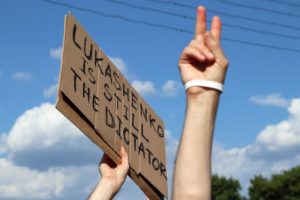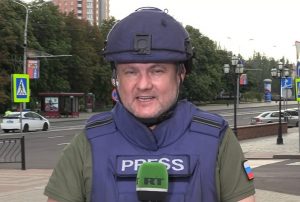London – President Aleksander Lukashenko, an ally of Vladimir Putin and dubbed “Europe’s last dictator”, completed two years of his sixth term this week, ruling Belarus amid extreme repression following elections that sparked intense protests in the country because it was deemed fraudulent.
According to statistics from the Vesna human rights center, around 7,000 people were detained in the country during the period of 9-14 August 2020. Among them are a large number of journalists from media outlets and independent professionals.
The International and European Federations of Journalists (IFJ/EFJ) and the Belarusian Association of Journalists (BAJ) are responsible for 30 media professionals currently imprisoned in the country.
Unprecedented pressure in Belarus
“Over the past two years, the media has faced unprecedented pressure from the state, whose sole purpose is to destroy independent journalism in Belarus,” says the IFJ.
Belarus ranks 153rd out of 180 countries in Reporters Without Borders’ press freedom rankings.
And it was named Europe’s most dangerous country for journalists until Russia’s invasion of Ukraine, “for suppressing the independent media and their reporters.”
Among the measures taken were the tightening of media regulations, the labeling of many independent media outlets as “extremist formations” and their publications as “extremist material”.
There were restrictions on free access to independent media sites and the closure of media outlets, as well as barriers to the distribution of print newspapers.
Even the European channel Euronews could not escape. In April 2021, the Lukashenko regime banned the broadcaster’s broadcasts in the country.
Also Read | ‘Europe’s last dictator’ bans Belarus Euronews
“Two years ago, instead of recognizing the democratic election, the authorities overthrew it, using violence, brutal suppression of democratic forces and exercising freedom of expression,” the International Federation of Journalists says.
Arbitrary detentions have become routine in the past two years. In 2020, at the height of the crisis, there were 480 cases in 2020.
Last year, 113 media workers were detained with prosecutions, often with physical and psychological violence, damage to or confiscation of professional equipment, and administrative arrests and fines, the IFJ reported.
“Such actions have also become part of the toolkit in the fight against independent journalists. One of the most gruesome forms of persecution was the initiation of politically motivated criminal prosecutions against individual representatives of the mass media.”
One of the arrested journalists is 24-year-old Russian Sofia Sapega, girlfriend of Roman Protasevich. The two were caught in a spectacular action that took place on a plane between Greece and Lithuania in May 2021.
Protasevich was the editor of the Belarus-based Telegram channel Nexta, which was instrumental in mobilizing the community in demonstrations against Lukashenko’s re-election.
In June of this year Sapega was convicted by a court in Belarus, while Protasevich is allegedly under house arrest.
Also Read | Belarusian journalist detained and girlfriend convicted a year after onboard film arrest
Another case that had international repercussions was Katsiaryna Andreeva, a reporter for Belsat TV, a Polish-based independent broadcaster.
On July 13, the Homel District Court sentenced the journalist to eight years in prison for treason (Article 356 of the Belarusian Penal Code), following a closed-door trial.
Andreeva was detained in November 2020 while live-streaming a peaceful protest against the ongoing rule of Alexander Lukashenko.
He was serving a two-year sentence for “organizing an illegal protest” and was due to be released on September 5, 2022. However, in February 2022, a new criminal case was opened against him on the charge of treason.
“The Belarusian dictator and his supporters do not shy away from any low point,” said Maja Sever, president of the International Federation of Journalists.
“They went so far as to prosecute a journalist who has already been wrongfully imprisoned on new fabricated charges. This judicial harassment and increasing pressure on journalists shows the true nature of the dictatorial regime in Belarus.”
In a joint manifesto published to mark the two-year anniversary of Lukashenko’s election, journalist associations call on the international community to “not turn a blind eye to the crackdown on independent media in Belarus and the blatant human rights violations against the country’s independence”. print.
Also Read | ‘Struggle against atheists’ and ‘preventive strike’: Russia makes narrative guide for state media to defend war
source: Noticias
[author_name]


